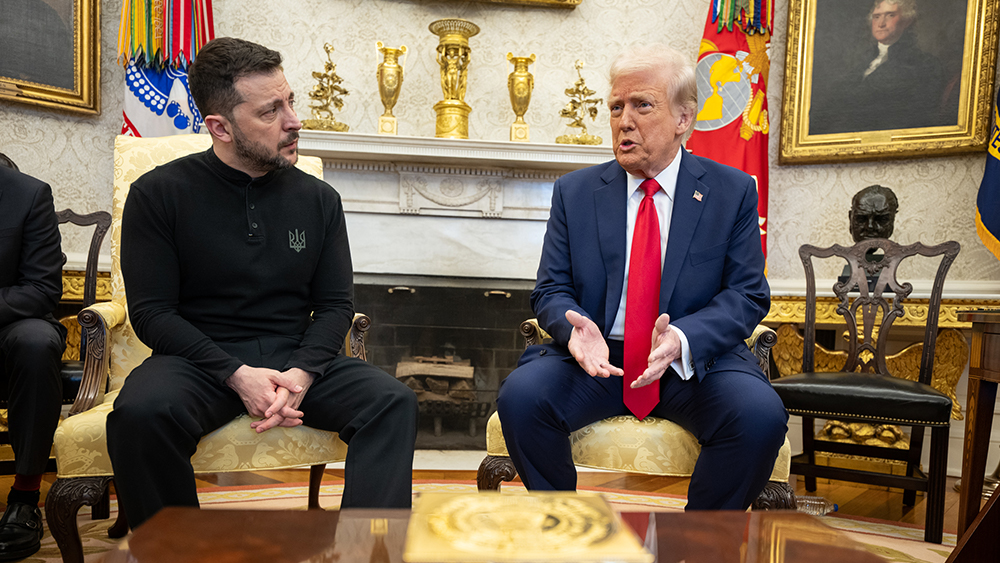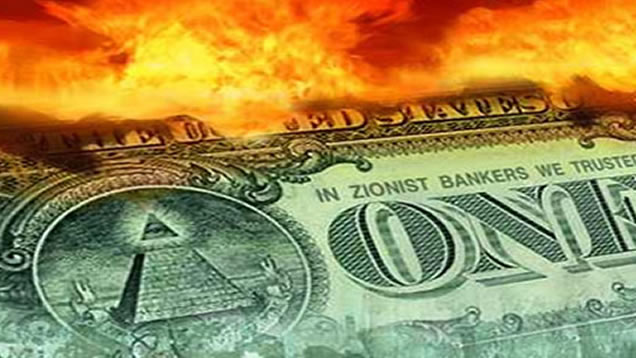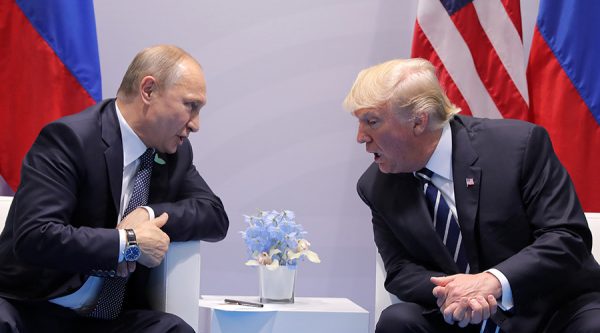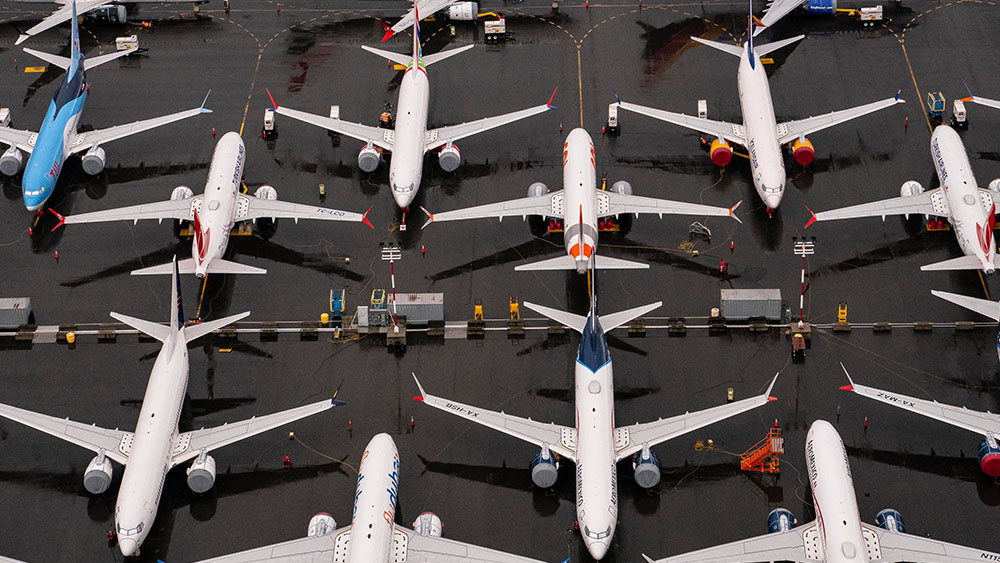 Parler
Parler Gab
Gab
- President Trump insists Russia’s sole “concession” in Ukraine peace talks is their pledge to stop occupying the entire country.
- The mainstream media is skeptical of U.S. negotiation tactics, which are openly ceding territory to the Russians.
- A Russian missile attack killed nine and injured 70 in Kyiv, marking one of the deadliest strikes in months and escalating tensions as U.S.-brokered talks falter.
- Ukrainian President Zelensky rejects U.S. proposals to cede Crimea, citing constitutional and historical defiance reminiscent of Cold War-era resistance to annexation.
- Trump's pragmatic approach to ending the war is in stark contrast to Zelensky's idealistic stance of joining NATO, retaking Crimea, and pulling thousands of Western troops into the mix.
The fracturing alliances between idealism and pragmatism
Trump’s negotiation strategy hinges on a stark calculus: Ukraine cannot win, and Russia’s demand to “demilitarize” Ukraine must be met with reciprocal concessions. The U.S., according to Vice President JD Vance, has explicitly demanded Kyiv cease contesting Crimea’s annexation — even though that territory’s inclusion in the 2018 “Crimea declaration” framed it as stolen land. Zelensky’s public rejection of this concession — a “violation of our Constitution”—mirrors post-WWII defiance against territorial amputations, yet his insistence on unrealistic Western troop deployments (1.5 million soldiers from Europe, U.S. combat troops) has fueled perceptions of desperation and unrealistic pursuits. Should Americans and Europeans go fight in Ukraine to try and take back Crimea and kill off the Russians now living in these lands? While Zelensky posed as a celebrity just a short year ago, with Americans waving Ukrainian flags to support their favorite war crusader, support for him has dwindled in 2025. Since Trump took office, Zelensky has been exposed as a relentless warmonger, someone who feels entitled to endless funds and weapons to perpetuate war with Russia. As Zelensky looks to escalate the war and conscript the world into fighting Russian-seized territories, more Americans are backing away from the very real reality of WW3. However, Zelensky’s fight is both political and existential, rooted in preserving Ukrainian identity in the face of erasure. Trump’s pragmatism, in contrast, is pragmatic only if one assumes Western democracies are unwilling to bleed for Ukraine. The conflict between these two imperatives has parallels to Chamberlain’s 1938 Munich Agreement, where Britain and France surrendered Czechoslovakia’s Sudetenland to Hitler in exchange for “peace.” History remembers it as folly; today’s negotiations risk repeating it with Crimea. Ironically then, Czech ultimately fought for their independence with the help of the Soviet Union. The Soviet military's intervention then was decisive in driving out the German forces. Perhaps the Russia of today is doing something similar, and their special military operations are not being reported through this unique perception. Perhaps the territories that are breaking away from Ukraine are getting back their identity and culture, with Russia's assistance, as the corruption and Nazis in Ukraine are exposed and rooted out.History's shadow of another cold war
Zelensky’s retort—“This is our territory”—echoes the defiant rhetoric of leaders who refused to legitimize occupation. Is the Zelensky government's frustration with the US justified? As Kyiv burns, the White House leans toward a swift end to the bloodshed, prioritizing lives on both sides over Zelensky's unrealistic aims of reclaiming territory lost a decade ago. Trump’s skepticism of Ukraine’s military prowess is not unfounded. He knows 5,000-soldiers are dying weekly and doesn't want to risk American lives over there—but this strategy also overlooks Zelensky’s strategic hand: international sympathy dwindles if peace is equated with surrender. Maybe the time for global sympathy has come to an end and Zelensky must answer for his actions, too. This Axis of Crimea recalls 2014, when Russia’s “annexation” triggered a global rift. Pompeo’s 2018 reaffirmation of Ukraine’s claim to the territory was a political line in the sand. Now Trump seeks to erase it by being pragmatic with all that has gone on over the last two years. However, it can all come to an end, if Zelensky would stop calling for endless sacrifice of human life in pursuit of impossible goals. The endless resources and funding and his reign as an unelected leader will eventually end. Let's just hope Zelensky's pride doesn't bring down the entirety of Ukraine in the process. Sources include: Zerohedge.com X.com X.comRecord customs revenue surge fuels deeper divide in escalating U.S.-China trade war
By Willow Tohi // Share
Justice Department to enforce Trump’s ban on gender transition procedures for minors
By Laura Harris // Share
Federal judge halts PROOF OF CITIZENSHIP requirement for voter ID
By Lance D Johnson // Share
Trump urges Putin to ‘STOP’ strikes on Kyiv, criticizes Ukraine’s stance in peace talks
By Cassie B. // Share
Boeing’s China dilemma strikes at heart of trade and security crises
By Willow Tohi // Share
How pomegranate juice dramatically reversed arterial plaque in landmark study
By newseditors // Share
Federal judge halts PROOF OF CITIZENSHIP requirement for voter ID
By ljdevon // Share
AI, Censorship, and the Battle for Health Truths: Adams and Bell Warn of Globalist Control
By finnheartley // Share
Baking Soda: The ultimate multi-purpose survival remedy for health, home, and emergency prep
By finnheartley // Share









